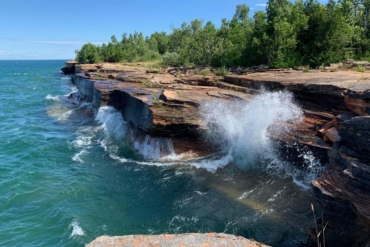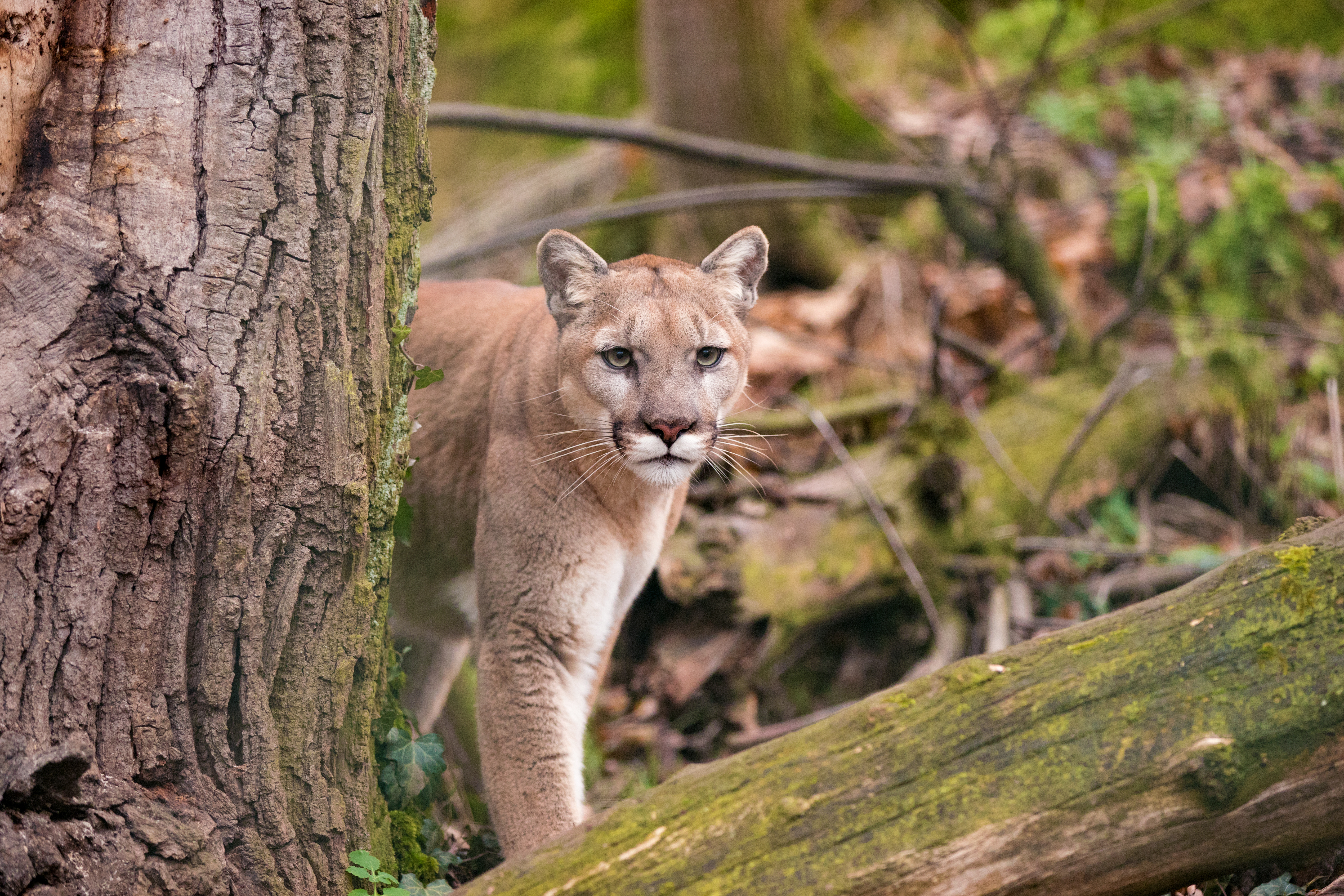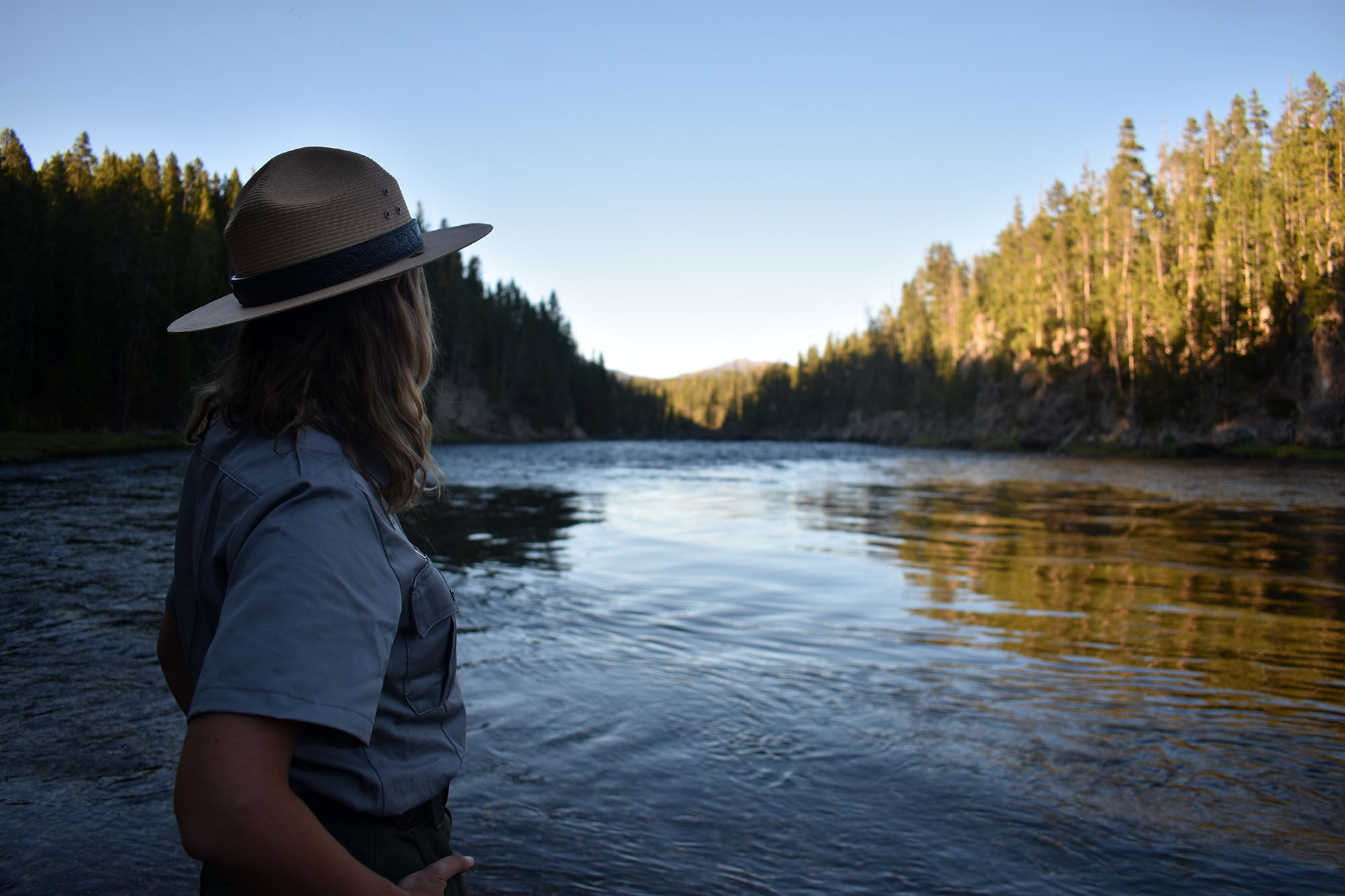While a road trip to your favorite national park seems like the perfect opportunity to bring Fido, you may be surprised that most national parks aren’t incredibly dog-friendly. Here are the best ones that are.
If you do your research ahead of time and plan well, you can enjoy a road trip for the books with your furry friend. Here, we’ve rounded up seven of the best national parks to visit with dogs, along with our favorite hikes and campsites at each.
And if you want your pup to pull their weight, check out our list of the best dog backpacks.
The Best National Parks to Visit With Dogs
Acadia National Park, Maine

Located primarily on Maine’s Mount Desert Island, Acadia National Park is a 47,000-acre recreation area along the Atlantic coast. Home to the highest rocky headlands along the Atlantic coastline, a variety of different habitats, and rich cultural heritage, the park is one of the top 10 most-visited national parks in the U.S.
The park has 27 miles of historic motor roads, 158 miles of hiking trails, and 45 miles of carriage roads. Almost all of these welcome dogs. The only exceptions are a few hikes that require ropes and ladders. The carriage roads, originally funded by John D. Rockefeller Jr., are among the best options for visitors with dogs.
These wide gravel paths wind through deep forests, around pristine ponds, and over sturdy stone bridges. They’re perfect for a relaxing walk or an all-day trek without the steep climbs and tricky footing found on some of the park’s more technical trails.
Popular hikes include Bar Island Trail, Schooner Head Path, and Wonderland Trail. For dogs that enjoy a moderate challenge, Gorham Mountain Trail offers sweeping views of the Atlantic without the ladders or iron rungs that can make other routes off-limits.
If you’re up for an early start, the Cadillac Mountain Summit Road lets you drive to the top, and then walk a short paved path to catch the sunrise. Just be ready for crowds during peak season.
Pups Welcome
Dogs are also invited on the shuttles and are free to roam all of the public areas in the park, except for Duck Harbor Campground, Wild Gardens of Acadia, Echo Lake Beach, and Sand Beach during the high season. Many of the scenic pullouts and picnic areas welcome leashed dogs, making it easy to spend a full day exploring without leaving your pup behind.
And when it’s time to call it a night, Blackwoods and Some Sound View Campgrounds both allow dogs. Just be sure to reserve early, as sites fill quickly in summer and fall. Bring extra blankets for cooler coastal nights, plenty of water, and waste bags to help keep this special place clean.
With a little planning, Acadia can be an unforgettable destination where you and your dog can hike, relax, and take in some of the best scenery on the East Coast.
Great Sand Dunes National Park, Colorado

Featuring the tallest dunes in North America, Great Sand Dunes National Park offers a diverse landscape of wetlands, conifer and aspen forests, alpine lakes, and tundra. Nestled against the Sangre de Cristo Mountains, the park spans 30 miles and is open 24 hours a day.
Leashed pets are welcome anywhere in the park between High Dune and the Castle Creek Picnic Area, as well as throughout the adjoining Great Sand Dunes National Preserve. A popular hike is up to High Dune for a view of the entire dune field. The hike is a 2.5-mile round trip and climbs approximately 700 feet.
Many visitors also choose to hike out to Star Dune, the tallest in North America, which stands around 750 feet high. It’s a longer trek at about 6 miles round trip, but the panoramic views are worth the effort if your dog is up for the challenge.
Keep in mind that the sand surface can reach temperatures over 150 degrees Fahrenheit on sunny afternoons. Even if the air feels pleasant, the ground can burn your dog’s paws in seconds.
Before you start hiking, touch the sand with the back of your hand. If it feels too hot for you, it’s definitely too hot for your dog. Early mornings and evenings are the safest times to explore and offer some of the most spectacular light across the dunes.
The Medano Creek area near the base of the dunes is another great spot to cool off. In late spring and early summer, the creek flows like a shallow river, creating a natural splash zone where dogs can wade and play. Always supervise your pet around water, as the current can be stronger than it looks.
Sunrise & Sunset Goals
Visit at sunrise or sunset for the best views. The dunes can get hot during the summer months, so make sure it’s safe for your pup before venturing out.
If you wish to stay overnight, head to Pinon Flats Campground, open April to October. This campground provides convenient access to the dunes and basic amenities like restrooms and picnic tables. Be sure to bring plenty of fresh water, waste bags, and a shady spot for your dog to rest, since there are very few trees or natural cover in the area.
With the right preparation and a little extra care, Great Sand Dunes can be an unforgettable place to share sunrise hikes, starry nights, and a lot of sand-covered paw prints with your best trail buddy.
Shenandoah National Park, Virginia

Fifty miles outside of Washington, D.C., Shenandoah National Park is home to 200,000 acres of protected lands and a wide array of flora and fauna. Shenandoah is popular due to its cascading waterfalls, wooded areas, pastoral landscapes, and the stunning Blue Ridge Mountains.
The park has over 500 miles of hiking trails on offer, only 20 of which are off-limits to dogs. Popular hikes to do with your pup are Little Stony Man, Hawksbill Gap Trail, and the Rose River Loop. Or, if you’re feeling lazy, cruise the famous Skyline Drive to soak up the sites.
If you and your dog enjoy a little elevation, the Hawksbill Gap Trail takes you to the highest point in the park at over 4,000 feet. The summit offers panoramic views of rolling mountains and valleys that light up with color in the fall. For a more relaxed outing, the Limberlost Trail is a flat, accessible path that winds through lush forest and is perfect for older dogs or those new to hiking.
Be Bear Aware
Keep in mind that the park’s dense woodlands are home to black bears, deer, and plenty of smaller critters, so a strong leash and good recall commands are essential. Always keep your dog close, especially near overlooks or when wildlife is active around dawn and dusk.
If you’re planning to camp, the park’s campgrounds are well-suited for dogs, with pet-friendly policies and plenty of space to stretch out. You’ll also find dog-friendly rooms at Skyland, Big Meadows Lodge, and Lewis Mountain Cabins if you prefer a soft bed after a day on the trail. Reservations fill quickly during peak seasons, so it’s a good idea to book early.
No matter which trail or overlook you explore, bring plenty of water and waste bags, and check trail maps for seasonal closures or restrictions. With so much ground to cover, Shenandoah is an ideal place to spend a weekend or longer adventuring with your dog among some of the most beautiful landscapes on the East Coast.
Petrified Forest National Park, Arizona

Located in northeastern Arizona, Petrified Forest National Park was given its name due to the large deposits of petrified wood that span the park. The landscape feels like a trip back through time, with historic structures, archaeological sites, 200-million-year-old fossils, and remnants of 13,000 years of human history spread across the terrain.
The park offers a Bark Ranger program specifically designed for pets. When you stop by the visitor center, you can pick up a Bark Ranger tag and learn about how to Leave No Trace with your dog. This simple program is a fun way to get your pup involved and help protect the delicate resources that make this place so unique.
Leashed pets are welcome on all of the park’s official trails, roads, and designated wilderness areas. Many of the trails are short and range from easy to moderate, making them perfect for dogs of all energy levels.
The Crystal Forest Trail is a paved, accessible loop that winds through some of the most colorful petrified logs you’ll ever see. For a slightly longer adventure, Blue Mesa Trail leads into a surreal landscape of bluish badlands with panoramic views in every direction.
So Many Points of Interest
During your visit to the park, be sure to stop at Tiponi Point, the Painted Desert Rim Trail, Puerco Pueblo, Newspaper Rock, the Tepees, Blue Forest hike, and Crystal Forest. Driving Route 66 through the park is another highlight, with plenty of pullouts where you and your dog can hop out to stretch your legs and take in the views.
Dogs are welcome in the backcountry, so if you plan on staying the night, you can post a tent for you and your pup. You’ll need a free wilderness permit, which you can pick up at either entrance station. Campsites are primitive with no facilities, so plan ahead and bring enough food, water, and waste bags for the duration of your stay.
Keep in mind that the desert environment can be harsh, especially during the summer months. Daytime temperatures often climb well over 90 degrees, and shade is almost nonexistent along most trails. Early mornings and evenings are the best times to explore comfortably. Before heading out, test the ground temperature with the back of your hand to make sure it’s not too hot for your dog’s paws.
With a little preparation, Petrified Forest is a one-of-a-kind place to discover ancient landscapes, vivid colors, and quiet solitude with your dog right by your side.
Congaree National Park, South Carolina

Located 18 miles from South Carolina’s capital city, Congaree National Park is a 26,276-acre national park that preserves the largest tract of old-growth hardwood forest in the United States. Towering loblolly pines, ancient bald cypress trees, and rich wetlands create a landscape that feels almost prehistoric.
The Congaree and Wateree rivers wind through the park, allowing visitors the opportunity to kayak, canoe, and fish on the waterways. Paddling through the flooded forest offers a completely different perspective, with giant trees rising straight out of the water and Spanish moss draping the branches overhead.
The park is ideal for furry friends, as pets are allowed on all trails, including the boardwalk, in and on the river, and in all of the campgrounds. The elevated Boardwalk Loop is especially popular for dog owners who want an easy, scenic route without worrying about muddy paws.
Hike Your Tail Off
Popular day hikes include the Boardwalk Loop, Weston Lake Loop, River Trail, and Kingsnake Trail, all of which offer glimpses of the impressive biodiversity the park has to offer. You might spot barred owls, river otters, or even a wild hog crossing your path. If you and your dog prefer longer treks, the River Trail runs nearly 11 miles and leads to the Congaree River itself.
In addition to backcountry camping options, Congaree is home to two designated campgrounds: Longleaf Campground and Bluff Campground. Both sites are dog-friendly and offer a peaceful place to set up for the night under towering pines. Just be sure to bring insect repellent, as mosquitoes are plentiful, especially in warmer months.
Pro tip: Keep in mind that many of the trails flood in the spring. If you plan on doing some hiking, you may want to schedule your trip for late fall or winter, when conditions are typically drier and temperatures are more comfortable for dogs.
Whenever you visit, always bring extra water, waste bags, and a sturdy leash. Congaree’s combination of dense forests, swampy lowlands, and quiet rivers makes it a unique destination to explore with your dog. With a little preparation, you’ll be ready to experience one of the most biodiverse corners of the Southeast together.
Mammoth Cave National Park, Kentucky

Home to the world’s largest known cave system, Mammoth Cave National Park is a western Kentucky gem. In addition to the impressive caves, the park also offers rolling hills, deep river valleys, a wide expanse of plant and animal life, and thousands of years of human history. It’s recognized as a UNESCO World Heritage Site and International Biosphere Reserve.
Although the caves themselves aren’t dog-friendly, there are plenty of dog-friendly trails around the visitor center as well as the popular Green River Bluffs Trail and the North Side Trails. The Green River Bluffs Trail is a moderate hike that winds through hardwood forest to a scenic overlook above the river. For an easier stroll, the Heritage Trail near the visitor center offers a paved loop with interpretive signs about the park’s natural and cultural history.
If you’re up for exploring more of the landscape, the North Side Trails include miles of paths through quiet woodlands and along old homestead sites. Dogs are welcome on these trails as long as they remain leashed, and you’ll find plenty of shaded spots to take a break along the way.
Kennels for Cave Adventures
Should you wish to visit the caves, and we suggest you do, Mammoth Cave Lodge offers a kennel where your dog can stay while you take a cave tour. Reservations for kennel space are recommended, especially during busy seasons, and you’ll need to provide proof of rabies vaccination at check-in.
At the end of the day, rest your head at Mammoth Cave Campground, Mammoth Cave Horse Camp, Maple State Park Campground, or Nolin Lake State Park Campground. Each site has its own character, from riverside spots to quiet forest clearings, and all are pet-friendly. Be sure to bring plenty of drinking water for your dog, as summer temperatures can climb quickly, and ticks are common in grassy areas.
Mammoth Cave is a place where you can spend the morning hiking forested trails with your dog, the afternoon exploring the vast underground labyrinth, and the evening relaxing by the campfire under a sky full of stars. With a little planning, it’s an ideal destination to experience Kentucky’s natural wonders together.
White Sands National Park, New Mexico

White Sands National Park is about as dog-friendly as they come. Pets are allowed anywhere in the park that humans are, except for the visitor center and gift shop. Spanning 145,762 acres in south-central New Mexico, the park is surrounded by the White Sands Missile Range and is home to the largest gypsum dune field in the world.
During your stay at the park, take some time to play on the dunes or explore one of the five official hiking trails on offer. The Alkali Flat Trail is the longest route at about 5 miles round trip, leading you deep into the heart of the dunes with sweeping views in every direction. For a shorter outing, the Dune Life Nature Trail is an easy loop with interpretive signs about the unique plants and animals that thrive in this harsh environment.
Watch the Temps
It’s best to visit during the fall, winter, or spring, as temperatures can get dangerously high during the summer months. Even in cooler seasons, the sun reflects brightly off the white sand, so bring plenty of water and a collapsible bowl, and consider dog booties to protect paws from hot surfaces. Sunglasses and sunscreen are helpful for you, too.
If you wish to stay overnight, 10 backcountry campsites are available on a first-come, first-served basis. Each site offers a chance to watch the dunes glow pink and gold at sunset, and then sleep under a sky crowded with stars. You’ll need to carry all your supplies in with you, including water, food, and waste bags. The campsites are primitive, so plan carefully before heading out.
White Sands is a place where you can hike, run, or just relax while your dog bounds through some of the most surreal scenery in the Southwest. With a little preparation and awareness of the weather, it’s an unforgettable destination to share with your pup.
Dog Etiquette in National Parks: The Do’s and Don’ts
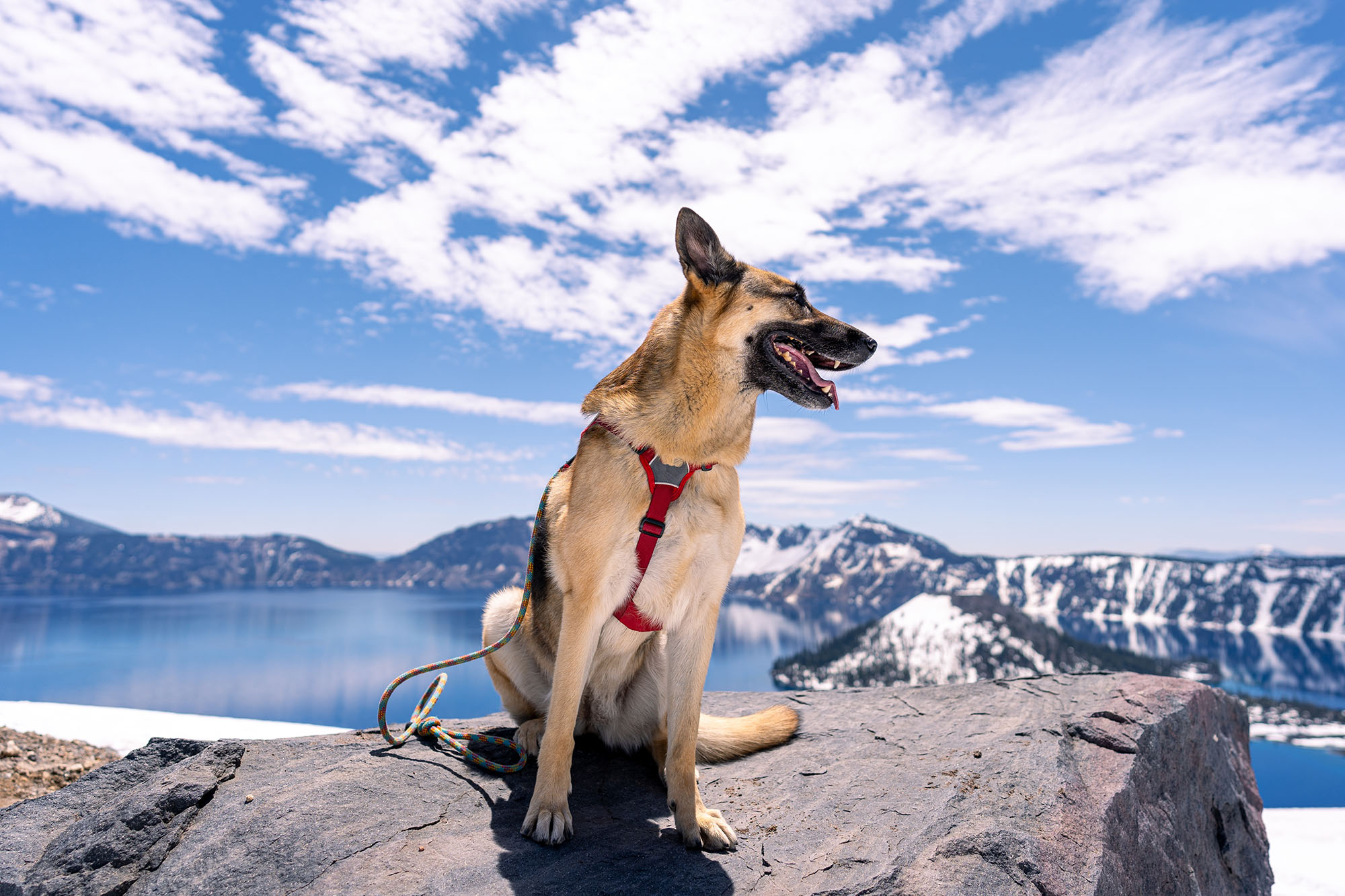
Bringing your dog into a national park isn’t just about showing up and clipping on a leash. It’s about understanding how your four-legged friend fits into a landscape that’s shared with wildlife, other hikers, and fragile ecosystems.
Keep Your Dog Leashed
Most parks require dogs to be on a leash no longer than 6 feet at all times. This isn’t just a formality. Even the most obedient dogs can get startled by wildlife or bolt after an interesting smell.
Loose dogs have been known to chase deer, tumble into thermal features, or get injured by larger animals. A leash keeps everyone safe and shows respect for other visitors who may not be comfortable around dogs.
Leave No Trace, Even With Paws
Picking up after your dog isn’t optional. Dog waste doesn’t belong on the trail or tucked behind a bush. It carries bacteria and parasites that can spread disease to native wildlife and pollute water sources.
Always carry extra waste bags and pack them out to a trash bin. If you’re camping, double-bag the waste until you can dispose of it properly.
Respect the Quiet
A national park can feel like a cathedral of silence. The last thing other hikers want is constant barking. If your dog gets anxious or tends to be vocal in unfamiliar environments, plan ahead. Bring treats, familiar toys, and consider shorter hikes where you can quickly head back if your dog needs a break.
Trail Courtesy Matters
Not every trail user is thrilled to meet a dog. When you see other hikers, especially those with children or pets of their own, step aside and keep your dog close.
Announce yourself if you’re approaching from behind, and never assume it’s OK for your dog to approach another. A quick “Can my dog say hi?” is much better than an unexpected nose in someone’s backpack.
Mind the Wildlife
It’s tempting to think your dog will just watch quietly from the sidelines. But even on a leash, dogs can spook wildlife, stress nesting birds, or disrupt feeding patterns. Keep a safe distance, and if you spot animals ahead, give them plenty of room.
National Parks That Aren’t Really Dog-Friendly
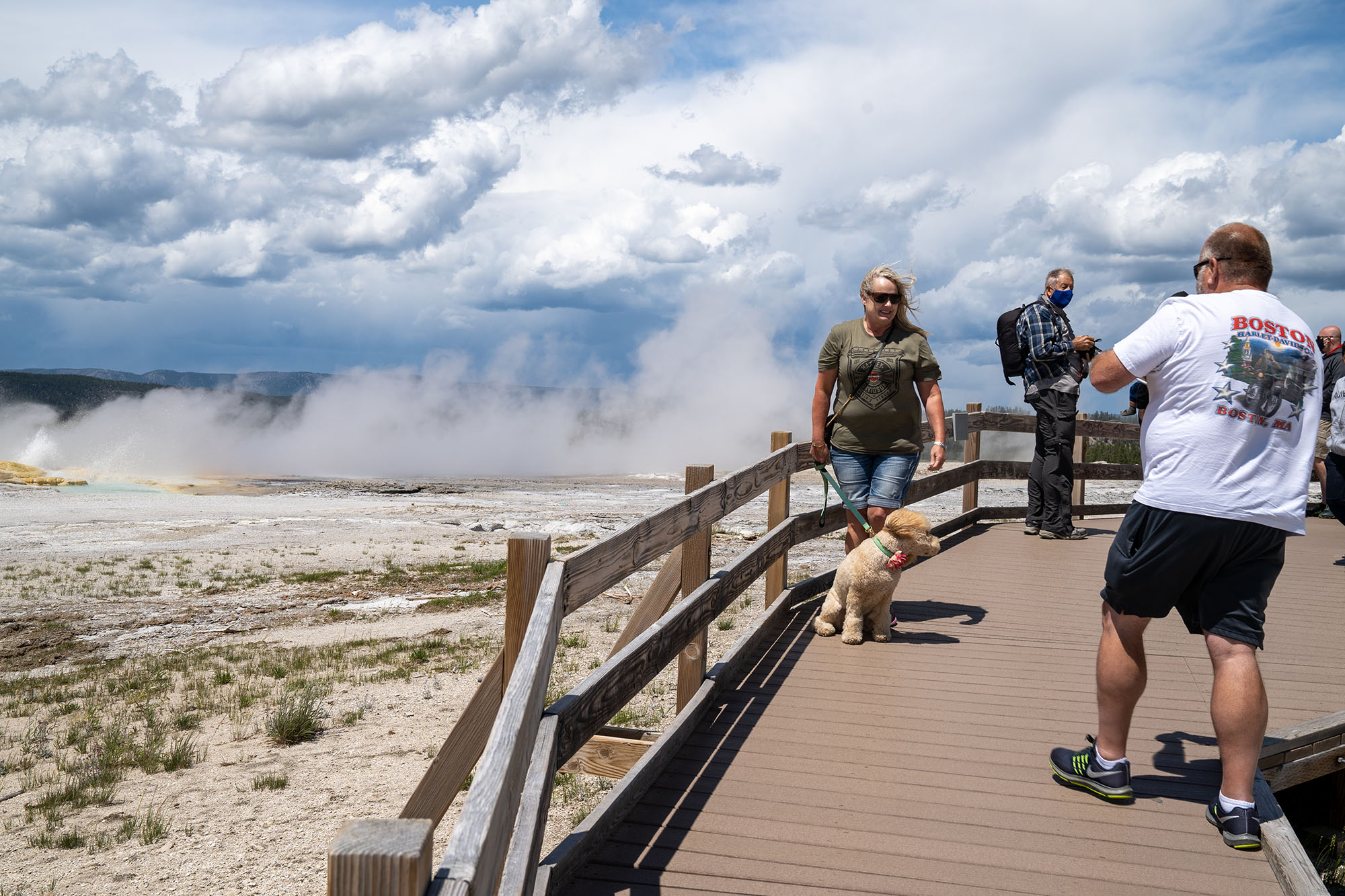
Not all national parks roll out the red carpet for canine visitors. In fact, some parks are downright inhospitable to dogs, and it’s usually for good reason.
Yellowstone National Park
Yellowstone enforces strict pet rules mainly because of its sensitive geothermal features. A curious paw or a little digging can damage delicate formations that took thousands of years to develop. Not only that, it’s incredibly dangerous.
Dogs aren’t allowed on trails, boardwalks, or in the backcountry. Beyond the risk to the landscape, pets can also disrupt wildlife by leaving scent trails or provoking defensive behavior from bears and wolves that call the park home.
Yosemite National Park
Yosemite restricts dogs to developed areas, paved roads, and campgrounds. The sheer number of visitors and sensitive habitats make it too risky to have pets roaming trails. Yosemite’s famous granite cliffs may look inviting, but loose dogs can disturb wildlife that’s already stressed by human activity.
Zion National Park
Zion allows dogs only on the Pa’rus Trail. That’s it. The steep canyon walls and fragile desert environment don’t mix well with curious pups. Even on that one trail, you’ll need to be vigilant about heat exposure and sharp rocks.
Rocky Mountain National Park
Rocky Mountain is another park with very limited access. Dogs can be in parking areas and campgrounds, but not on hiking trails. The abundant wildlife and narrow paths make it tricky to share space safely. Moose, elk, and bears are all regular visitors here, and an unexpected encounter can end badly for everyone.
Glacier National Park
Glacier doesn’t allow dogs on most trails or in the wilderness. The park’s rugged terrain and high concentration of grizzly bears make it a risky place for pets. Even campgrounds have restrictions, and dogs must be leashed or confined at all times.
Before you pack the car, check the park rules carefully. These restrictions protect not just the land but your dog, too. A little research upfront can save you the disappointment of arriving only to realize your pup has to stay in the parking lot.
Gear Essentials for Adventuring With Your Dog
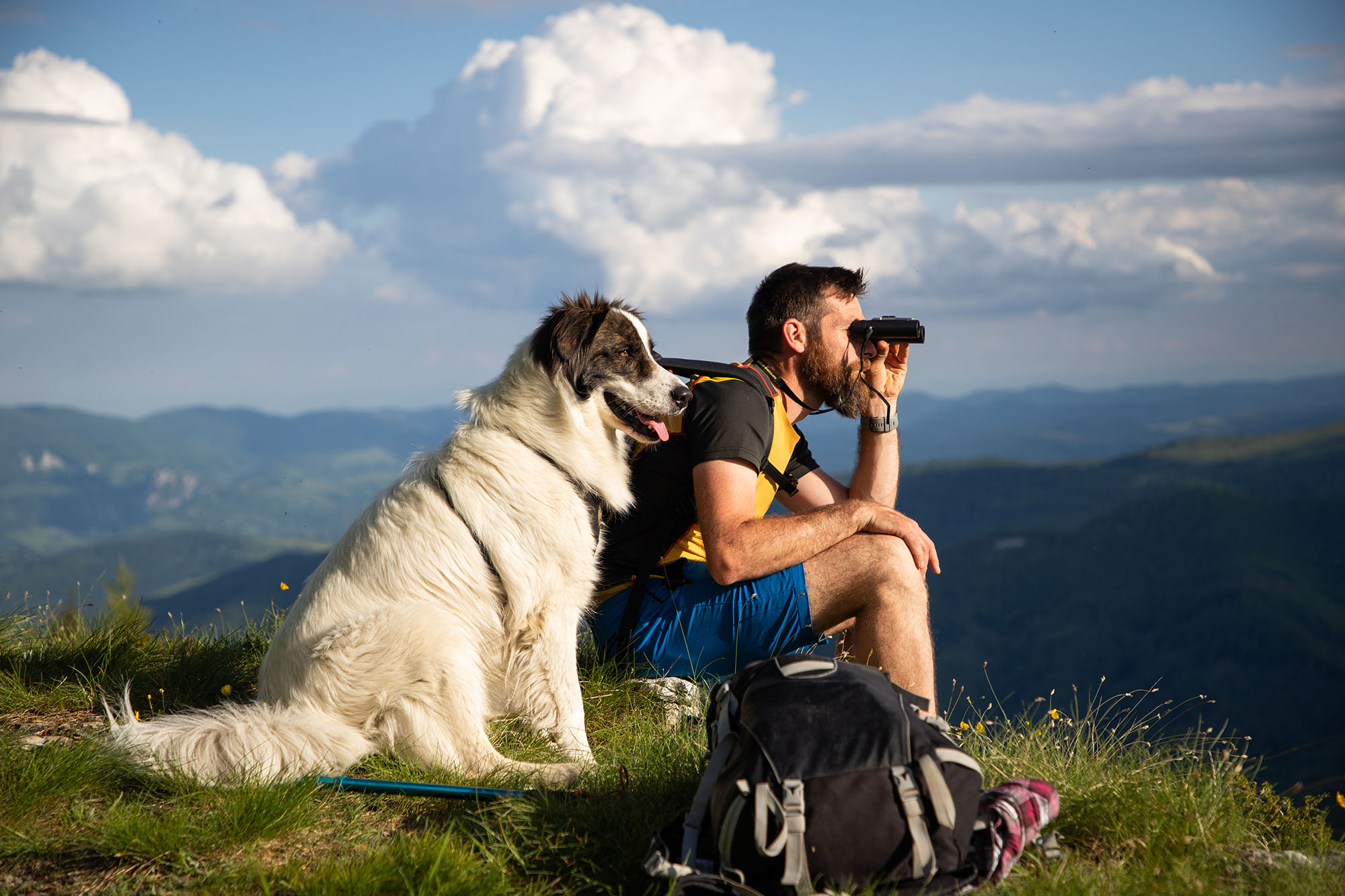
Your dog might be low-maintenance at home, but the outdoors demands a bit more preparation. The right gear keeps your dog safe, comfortable, and ready for whatever the trail throws your way.
Collapsible Water Bowls
Lightweight and easy to stash, these make sure your dog stays hydrated without the mess. Choose bowls that dry quickly and can clip to the outside of your pack.
Dog Boots
Rough rock, hot sand, and icy trails can wreck paws fast. A set of well-fitted boots protects against cuts, burns, and frostbite. Practice wearing them before your trip so your dog doesn’t spend the hike high-stepping like a tap dancer.
Cooling Vest
In hotter climates, a cooling vest can help prevent heat stress. Soak it in water, wring it out, and slip it on your dog to keep their core temperature down. This can be a lifesaver in desert parks with little shade.
Hands-Free Leash
A waist leash frees up your hands for trekking poles or taking photos, and it helps keep your dog close in crowded areas. Look for one with some stretch to absorb sudden lunges.
First-Aid Kit
Don’t skimp here. Pack gauze, antiseptic wipes, tweezers for removing thorns or ticks, and booties to protect an injured paw. If you’re hiking far from help, add a thermal blanket in case your dog gets chilled. You can easily add dog-specific gear to your personal first-aid kit, or you can create one specifically for your pup.
Dog Pack
If your dog is in good shape, let them carry a bit of their own gear in a dog pack. Most dogs can comfortably haul up to 10-15% of their body weight. Load it with treats, waste bags, and a small water bottle.
ID Tags and Microchip Info
Always double-check that your dog’s ID tags are current. A microchip is even better insurance in case you get separated.
Portable Shade or Blanket
If you’re planning to rest or have lunch along the trail, a lightweight mat or blanket gives your dog a clean spot to relax.
Tips for Keeping Your Dog Safe on the Trail

Adventure’s more fun when everyone comes back safe and happy. These tips will help you avoid emergencies and make the most of your time outside:
Watch for Overheating
Dogs can’t sweat like we do. Heavy panting, drooling, and unsteady steps are early warning signs. If you notice any of them, stop immediately. Find shade, offer water, and let your dog rest until they’re back to normal.
Be Wildlife Aware
Keep an eye out for snakes, especially in the Southwest, and always scan ahead for large animals. Even something as small as a porcupine can turn a great day into an emergency vet visit.
Avoid Letting Your Dog Drink From Streams
Even crystal-clear streams can carry parasites like giardia. Bring your own water and offer it frequently, especially if the weather’s warm.
Recall Skills Are Essential
Even on a leash, your dog should respond instantly to commands like “leave it” or “come.” A curious sniff can escalate quickly if you stumble across a bear, moose, or a nest of ground-nesting birds. Practice recall at home before your trip.
Check Paws Often
Sharp rocks, ice, and hot sand can cause cuts or burns. Inspect your dog’s feet during breaks and after the hike. Clean out any debris and look for redness or swelling.
Pack Extra Food and Treats
Hiking burns calories fast. Bring more food than you think you’ll need, plus high-energy snacks to keep your dog fueled.
Camping With Dogs in National Parks

Camping overnight adds a whole new layer of planning when your dog’s along for the ride. A little extra preparation goes a long way toward keeping everyone safe and comfortable.
Choose Dog-Friendly Campgrounds
Not every campground welcomes dogs, and some have specific rules about where they can be. Before you book, confirm that your dog is allowed and whether there are designated pet areas nearby.
Never Leave Dogs Unattended
Leaving your dog tied up while you hike, explore, or use the restroom isn’t safe. Wildlife can approach, temperatures can change suddenly, and unexpected noises can spook even a calm dog.
Keep Food Secured
Dog food is as appealing to bears and raccoons as your own meals. Store it in bearproof containers or lock it in your vehicle overnight. The last thing you want is to wake up to a bear sniffing around your tent.
Pack for Comfort
Bring a dedicated sleeping pad or blanket for your dog so they’re not stuck on cold ground. If temperatures drop, consider an insulated jacket or sleeping bag designed for dogs.
Stay Close and Calm
Nighttime can be loud in a campground, with animals moving around and people arriving late. Keep your dog inside the tent or vehicle to avoid stress, and make sure they’re secure if you need to step outside.
Mind the Morning Routine
Be courteous to neighbors by keeping your dog quiet at dawn. Take a quick walk away from tents and campsites if your dog needs to stretch or relieve themselves.
Final Thoughts: Exploring the Parks With Your Pup

Hitting the trail with your dog is one of the best ways to explore America’s national parks, but it comes with extra responsibility. Every paw print leaves a mark, and it’s up to us to make sure that mark is as gentle as possible.
From picking the right park to understanding leash laws, every choice you make keeps your dog safe and protects the land we all love. Some parks roll out the welcome mat for pets, while others keep access limited to preserve sensitive landscapes and safeguard wildlife. Knowing the difference can save you frustration and keep your adventures stress-free.
Whether you’re sticking to paved paths or venturing into backcountry campsites, preparation matters. Pack the right gear, practice good trail etiquette, and always be ready to pivot if conditions change. Your dog depends on you to set the tone and make smart decisions.
With a little planning, there’s no reason you and your pup can’t enjoy unforgettable days under big skies, along winding rivers, and across rugged terrain. Respect the rules, respect the wild, and you’ll both come home with memories that last longer than muddy paw prints on the car seat.


